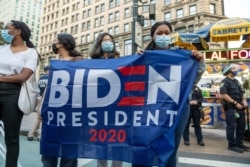Here’s one thing Democrats and Republicans can agree on: They’re stressed out. Big time. And the 2020 U.S. presidential election is to blame.
“If the news goes on, that to me, just listening to it, that is grating, and it causes anxiety for me so that I get wound up and can't fall asleep,” says Betty Mattimore, a Virginia financial services professional who supports President Donald Trump.
“Very high levels of anxiety, not sleeping well...I'm extremely stressed out,” says Julie, an attorney from Maryland who supports former Vice President Joe Biden. “I'm so stressed out that I can't even really talk about it or think about it or read about it.”
Julie asked VOA not to use her last name for privacy reasons.
A majority of U.S. adults can identify with Mattimore and Julie, according to a recent American Psychological Association report that finds 68% of U.S. adults view the presidential election as a significant source of stress in their life.
It’s a bipartisan concern, with 76% of Democrats, 67% of Republicans and 64% of independents feeling the strain.
Also, 77% of U.S. adults say they’re worried about the future of the nation.
“There are many compounded stressors that people are recording right now and they all will be influenced, one way or another, by the outcome of this election,” says Dr. Vaile Wright, a clinical psychologist and co-author of the report on election stress.
“Things like access to health care, climate change, the pandemic, social unrest, mass shootings, all of these things have a really significant national impact,” Wright adds. “And whoever is in charge either will or will not identify solutions to these national-level stressors.”
The proportion of Black adults who are stressed about the election is significantly higher than it was during the last presidential election, jumping from 46% in 2016 to 71% this year. And adults with chronic conditions are more likely than those without a chronic condition to report the election is a source of stress.
Julie, the Biden supporter, worries about how she’ll cope if Trump wins again.
“I feel like the last election was such a shock,” she says. “And the country has experienced so much turmoil and loss since then, but I'm still feeling traumatized from it. And if that happens again, I just don't I honestly don't even know how I'm going to get through another four years.”
Uncertainty is a big driver of stress.
“We're in an unprecedented situation where almost everything is uncertain at this moment. We have an upcoming election where, you know, we have parallel levels of both early voting but also mail-in voting so that drives a lot of the uncertainty,” Wright says.
Mail-in voting, voter fraud and the integrity of the election are on the mind of Brendan Mattimore, Betty’s husband, also a Trump supporter.
“I'm very concerned and very stressed out. … I always trust the American people to make decisions and these things usually work out, but I think there's a hand on the scale,” says Brendan, who works in budget and finance. “There's too much room for fraud and it's too much at stake in this election to think there's not people or organizations who are looking to take advantage of it and manipulate the process.”
And who does he believe will be behind the fraud?
“I think it's going to be more on the Democratic side,” he says. “There might be some issues on the Republican side, but I just don't think it's going to be too prevalent.”
Moving from the more liberal East Coast to the conservative Midwestern state of Indiana has been an eye-opening experience for Biden supporter Adrienne LaBorwit.
“Now that I live here, I understand how Trump got elected. Whereas, when I lived out in (Washington) D.C., I just, I didn't understand, like how in the world would he appeal to anybody in this country?” says LaBorwit, who works in business development. “I think they're just tired of the old guard... that it doesn't do Joe Biden any favors that he's been in Congress [for 36 years].”
And with that new insight, comes more strain.
“Now, I get it,” LaBorwit says. “So I think that acknowledgement and understanding only increases my anxiety.”
Meanwhile, Betty Mattimore, the Trump supporter, is focused on what will happen after the election.
“I'm really hoping that the country can just move on. Now that being said, I think that, either way... there will be some sort of chaos coming after this election,” she says. “I feel that we've never really accepted President Trump as the president after 2016. What if he wins again? Is it going to be four more years of impeachment proceedings?”
“I just want the politicians to govern,” she adds. “I want them to do what they're supposed to do for the country, for families. I'm tired of all of the politics.”






